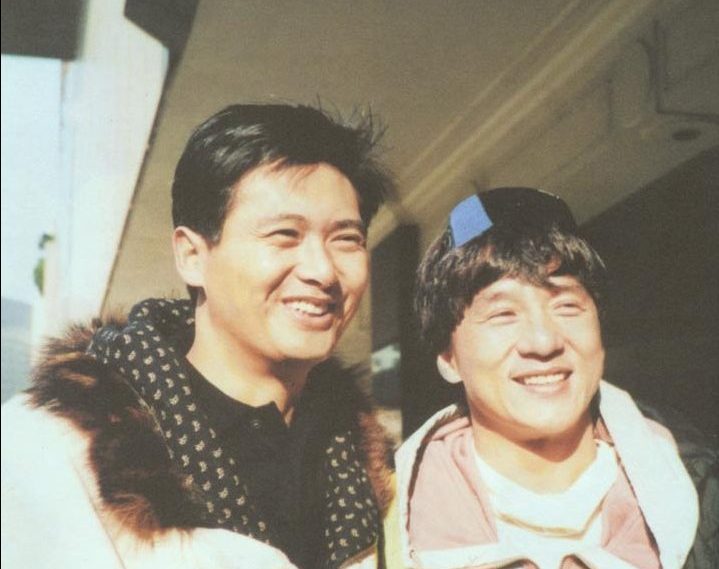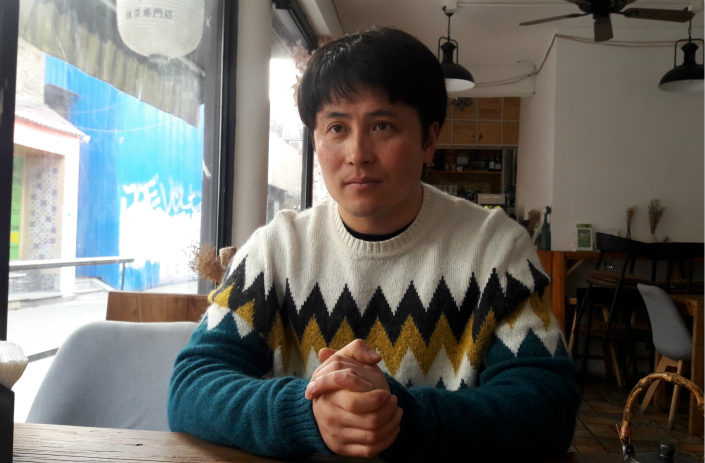Jackie Chan has a message for Hollywood.
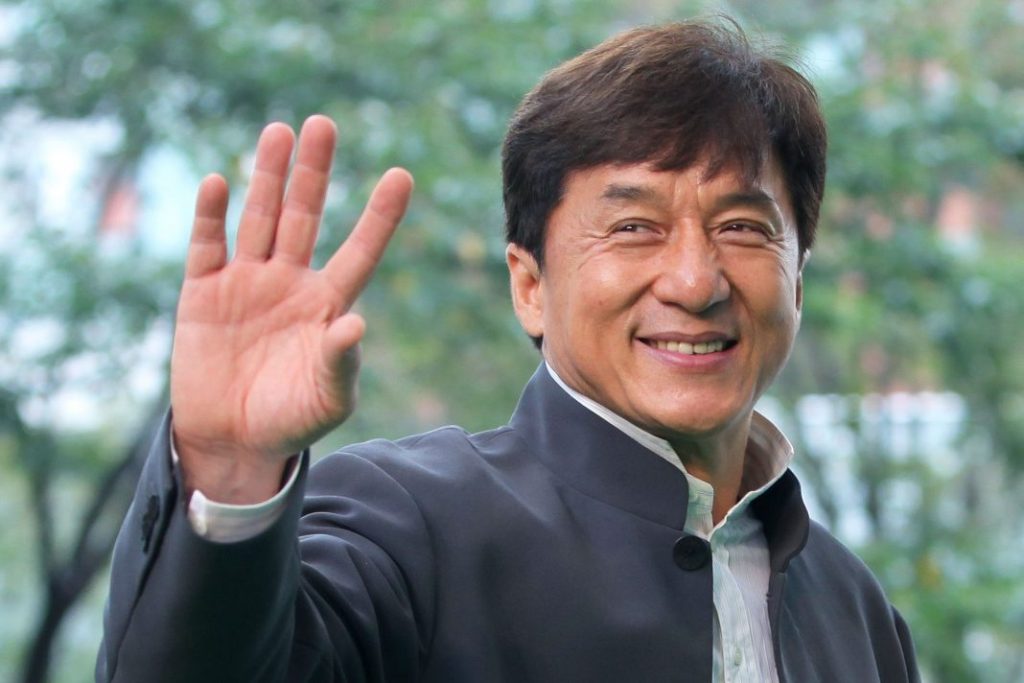
After more than 130 movies in which he perfected his own comic persona and a delirious slapstick and acrobatic fighting style, the 63-year-old action star has set his sights on becoming a dramatic actor.
“I want to change people’s thoughts,” he says. “I am not an action star or action-comedy star anymore, I am an actor. I can do so many things, just like Robert De Niro. I am waiting for the next drama film, so Hollywood—please hire me!”
Until now, the comic side of Chan’s film persona has been as important as his action skills and it was comedy that set Chan apart from other kung fu and action stars. But he has taken a step along the dramatic path with his most recent film, STX Entertainment’s The Foreigner, in which he plays a grieving father seeking revenge for the death of his daughter.
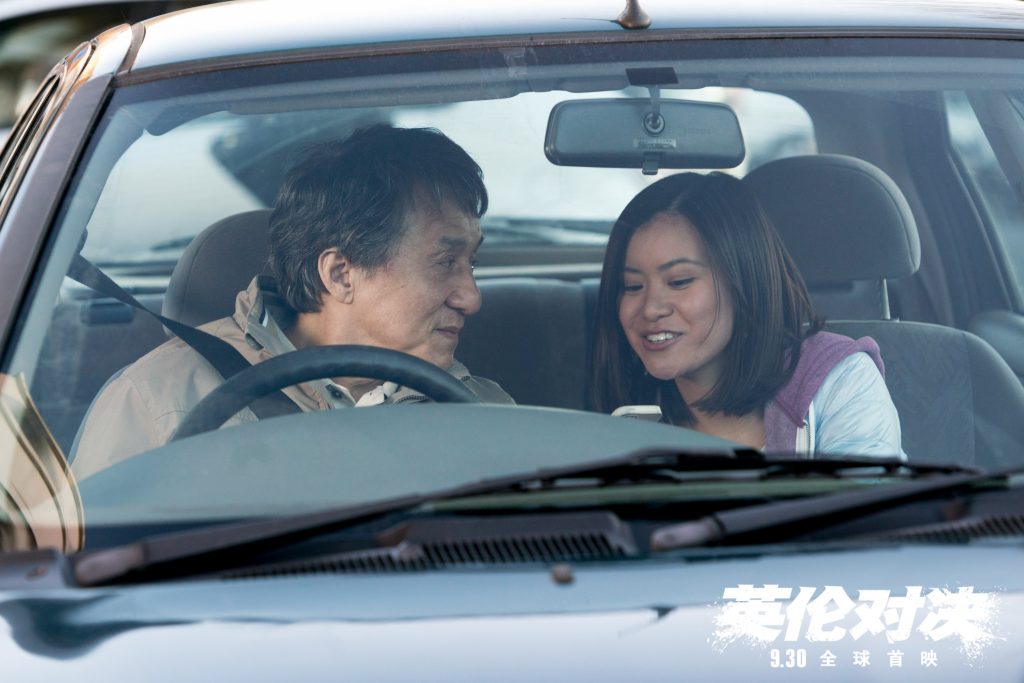
Jackie Chan as Quan and Katie Leung as Fan (Quan’s Daughter) in car in ‘The Foreigner’
He admits it was a stretch for him because of the sometimes difficult dialogue and the need for him to cry real tears at one point. “I have to speak English from my heart and the tears go down and it’s so difficult,” he says. “When I go home and everybody sleeps, I practice my English and I practice the dialogue.”
He is happy with the outcome. “I think I did a pretty good job,” he says with a cheery grin. “All these years, I wanted to do something different and show the audience another side of Jackie Chan.”
His desire to be recognized as a serious actor has been boosted by the awarding last year of an honorary Oscar and the words of Tom Hanks, who presented it.
Hanks, describing him as “the man who put the Chan in Chan-tastic,” declared: “Great acting comes in many different forms, but if you are an actor you always know it when you see it. Jackie Chan’s films have been incredibly serious, sometimes gruesomely so, as well as incredibly hilarious.”
Although he laughs and jokes, Chan is serious about wanting to be known as a dramatic actor as well as the action star-comedian whose superb athleticism combined with a sense of childlike wonder and eager-to-please demeanor has endeared him to audiences around the world.
And yet….and yet…
His next film will be Rush Hour 4, a return to the crowd-pleasing, fanciful action franchise in which comedy is a mainstay and in which he will once again team with Chris Tucker.
Partly because of his fractured English—he has been trying to improve it by watching CNN—Chan’s explanations are sometimes confused and confusing. Talking during a wide-ranging interview at the Four Seasons Hotel in Beverly Hills, he throws in references to his previous films and hops from one subject to the next without pause, although frequently returning to the dramatic-actor theme.
“In the old days, I worried about the box office, but these days, no, no more,” Chan says, peering through thick-rimmed glasses. “You cannot worry if this movie makes 100 million or 200 million. No. And sometimes making a movie is like gambling.You don’t know if the movie is good or bad. I just know that every movie I make, I do the best I can. I just follow my schedule because I know next year I will have Rush Hour 4, so I did The Foreigner. And then after Rush Hour 4, I cannot do Rush Hour 5 and I have to change, maybe to another drama or some other style.”
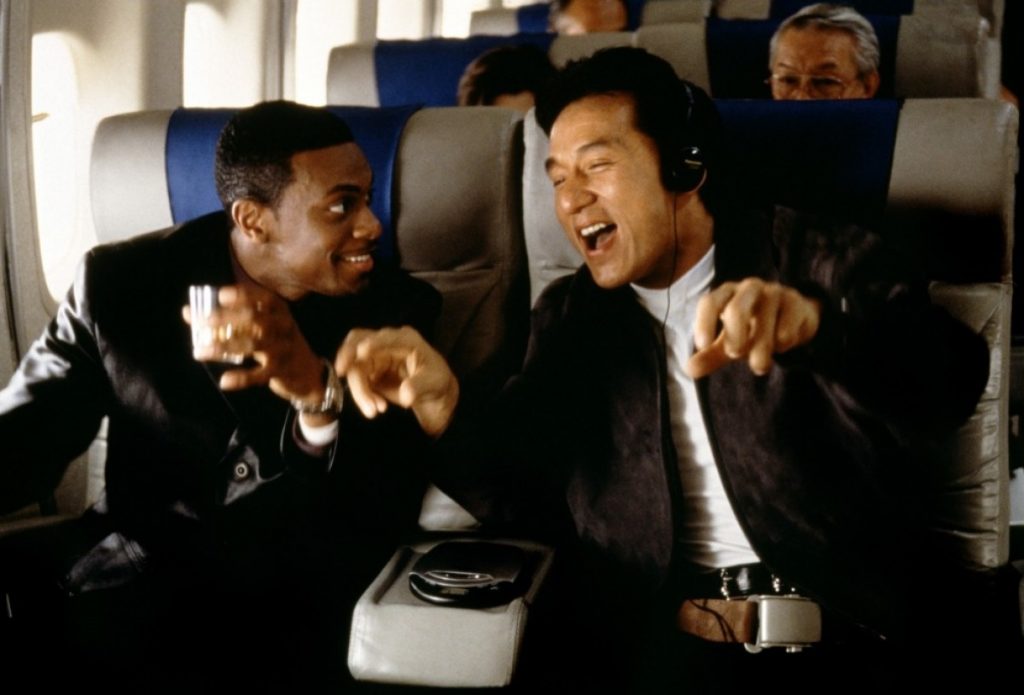
Jackie Chan Stars in ‘Rush Hour’ (1998)
Despite his iconic status, with millions of fans who will pay to see any movie starring him, Chan confesses he is apprehensive about their reaction if he totally changes his style—although, he says, he has been working on the change for years.
“All the action stars are gone after a certain age, so I’m preparing for my future,” he confides. “If you follow my movies over the last 20 years in China and America, you can tell—different characters, different scripts and different kinds of acting. I’ve been slowly, slowly letting the audiences accept me.
“Now I really want to be in a film where the whole movie is drama and not one punch—just drama,” Chan says. “But I am really scared if the audience would like it. I am not there yet, but a few years ago I made Shinjuku Incident and step by step I let the audience know that I am not an action star anymore, I am an actor. And now The Foreigner. But between that, of course, I have Chinese Zodiac and Dragon Blade and I have Kung Fu Yoga and I want to show that Jackie is a multi-talent and can do so many things.
“Of course, if a director hired me to do La La Land—Part 2, yes, I am going to do it,” he laughs. “Actually, I am not a good singer, but I have a very good voice.”
With his friendly, pug-nosed face and disarming smile, Chan does not look or act like a traditional action hero, offering a benign alternative to such macho stars as Jason Statham, Vin Diesel and even his mentor, Bruce Lee.
He started appearing in movies in his native Hong Kong when he was only eight years old and worked steadily, eventually starring in cheaply produced martial-arts movies such as 1976’s New Fists of Fury. He went on to become the biggest box-office draw in Asia and crossed over to the American screen with The Big Brawl in 1980. His mixture of death-defying stunts and genial, self-deprecating comedy gained him a massive following with films such as Rumble in the Bronx, the Rush Hour trilogy and Shanghai Noon and its sequel, Shanghai Knights.
He has always done all his own stunt work and the list of body parts Chan has injured while filming includes his head (it has a deep dent into which he will sometimes allow reporters to stick their fingers), eye, mouth, teeth, throat, neck, arm, shoulder, legs, foot, nose, ears, cheekbone, chin, hand, back, chest, pelvis and knee.
He formed the Jackie Chan Stuntmen Association in 1985, assembling his own team, training them and paying their medical bills. He also formed Jackie’s Angels, a casting and modeling agency to cast his increasingly elaborate productions.
Married to the Taiwanese actress Joan Lin for 35 years, he has nevertheless confessed to numerous affairs, writing in his book Never Grow Up, Only Get Older: “I actually was very popular among girls ever since I was young—girls would come to me like butterflies.”
Chan earns an estimated $50 million a year—not just from his films but also his myriad other businesses, which include everything from designer apparel and eyeglasses to movie theatres and Segway scooter dealerships. (He is known to ride one around his sets.)
It is impossible not to like Jackie Chan, and somehow his occasional boasts about his accomplishments can be quite endearing. In a nonstop diatribe in broken English, he touches on many subjects, including his charity work, his Oscar, children and, of course, his multi-talents.
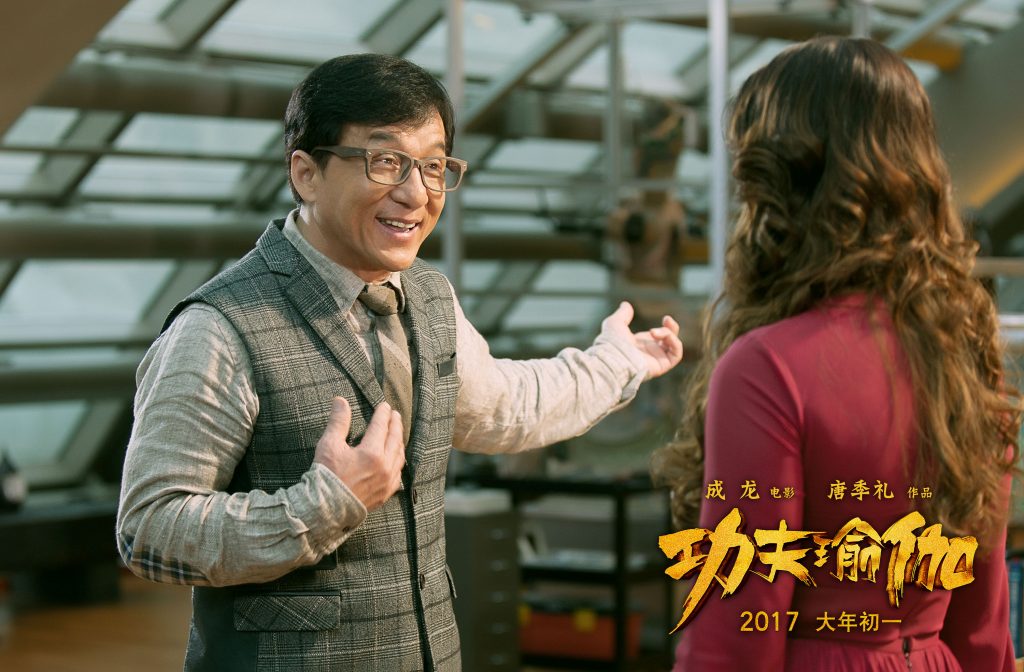
A Still from ‘Kung Fu Yoga’ (2017)
“My movies have comedy action and some peace and some love message,” he says. “When I am not filming, I do charities and go all around the world to help people.
“When I was younger, I didn’t like doing charity—I wanted to drink and play and watch car crashes like other young kids.
“But through charity, I have become a good person and it has taught me how to become a good boy and how to help people. Doing charity is like a snowball, getting bigger and bigger.”
He is an enthusiastic supporter of a vast array of charities, including UNICEF, Operation Smile and his own Jackie Chan Charity Foundation, which he founded in 1987 to provide funding for projects ranging from hospitals to scholarships.
Then there’s that honorary Oscar. “So I never thought I could get an Oscar,” he admits. “I just keep making cheap movies and I am a comedy-action star. Oscars and other awards were too far away. Tom Hanks or Robert De Niro, those kinds of stars can get Oscars, not me. Nobody said Rush Hour is good.” He laughs. “No, you never would. Even making The Foreigner, I never thought I could get an Oscar. I wanted change, that’s all.
“Then when I got an Oscar, I was just so happy. What I did for all those years was make movies from the heart, not just for money. I make these movies that are good for the children and good for adults and good for the world and peace. I speak out.And I do a lot of charity and helping people. And I built the biggest training center in the world, to train young talent and stunt guys, because I was a stuntman.
“Then, after 57 years, I get an Oscar. So all of what I was doing for all those years, I have done the right things.
“I am happy. A lot of people ask me, ‘Jackie, why do you keep so young?’ It’s because I was very poor and had no money and was a cheap stunt guy and then I spent the rest of my life doing stunts and becoming a star and I risked my life doing every movie.
“And I was a bad boy until I started doing charity, then I became a good boy and learned how to treat people. And today I have fame and money and so many things and I have nothing to worry about. I am the happy person.”
Jackie Chan may not be the energetic tornado of whirling kicks and punches he once was, but he is not bothered.
“It’s just: Ha! Ha!” he says. “I don’t need those kinds of things anymore. I need some good movies that have meaning… I no longer care about box office anymore. Forty years ago, I was like, ‘Box office win, we win.‘ That’s wrong. You have to let the people remember the movie—that it’s a good movie. I want to do something people will remember.
“I hope people will remember me as a good actor who can do so many things. I’ve proved already that I’m a director, writer, singer, stunt coordinator, action star—and also, I’m an actor.
“And remember me as…just another good person.”
– This article originally appeared on Film Journal.


